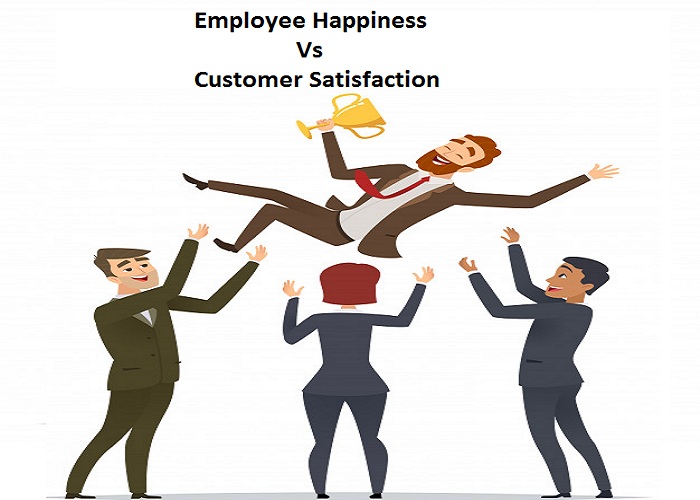As business owners it can be challenging to decide what is more important: Customer Satisfaction or Employee Happiness. After all, it is the customer who has chosen you for your unique skillset, for your expertise, and for your business. It is the customer who will advertise for you by word of mouth. It is the customer who brings you repeat business. And it is the customer who ultimately pays your bills.
However, without happy employees you will not have satisfied customers.
Happy Employees create Satisfied Customers. In general, you know how to satisfy your customer because you know about customer service. You yourself are a customer on a daily basis and you know what great customer service feels like. Because you are a customer and you know which businesses cater to you and satisfy your emotional needs as a customer, you can put yourself into your client’s shoes. You understand great customer service. But do you understand employee happiness?
Did you know that Happiness at work can increases your profitability even by 33% and increases your sales by 37%? According to Forbes, happiness at work decreases sick leave by 66%! Most business owners do not realize that their team is unhappy nor do they realize that they possess the power to create happiness for their employees.
Here are 6 tell-tale signs that your employees are Not Happy.
a) Increase in tardiness. Unhappy employees prefer to procrastinate coming to work. They are unhappy with their job and prefer to linger in their happiness away from work. Happy employees cannot wait to arrive at work. They like to be on time or even early.
b) Increase in sick days. Unhappy employees seek to avoid that which causes discomfort, i.e. working in a place that causes emotional discomfort. If they could avoid working altogether, they would, were it not for the need of a pay check. Happy employees enjoy being part of a team. They understand and appreciate the importance of teamwork and realize that without them the team will lose. Happy employees will minimize sick days.
c) Increase in gossiping. Unhappy employees need to vent their unhappiness and will do so by engaging in belittling others. Happy employees do not gossip because there is nothing to gossip about. If there is a problem, happy employees will address it.
d) Increase in short breaks because “I need a cigarette”. Unhappy employees are stressed. Their attention span is short and they need frequent breaks to get going again. Happy employees are engaged fully throughout the workday. They schedule personal time off and stick to it.
e) Increase in pranks. Unhappy employees are not engaged in their job and need to invent chaos in order or to fill the void of excitement and fun. Happy employees do not rely on pranks to increase fun at work. Happy employees are challenged, motivated and engaged by their job responsibilities.
f) Decrease in productivity. Unhappy employees are idle and stand around waiting for instructions. Happy employees are always a step ahead. They know what their responsibility is and because they are not micro-managed, they became leaders in their own right.
Most owners know about customer satisfaction but few understand the need, the fears, the motivation or the fun factors required to keep their team happy. Yet without happy employees you are destined to have few, if any, satisfied customers.
Happiness is affected by individual goals, by attitude, by gratitude, and I believe, most importantly, by different personality types. An exuberant, creative, and fun person’s idea of happiness is much different than that of a calm, serious, and structured employee. Know about personality differences to effectively create happiness in your practice, but foremost realize that your team may not be as happy as you think. And without a happy team, you do not have happy customers.
Unhappiness is as contagious as a yawn! Inspire smiles instead. Happy employees create happy customers.
Source: https://www.linkedin.com/pulse/employee-happiness-vs-customer-satisfaction-harsh-gupta/






